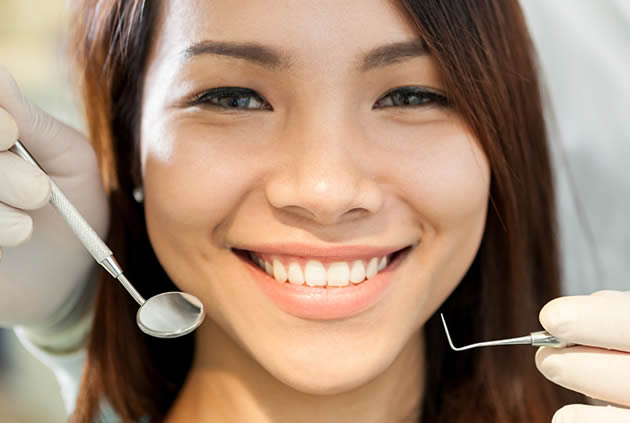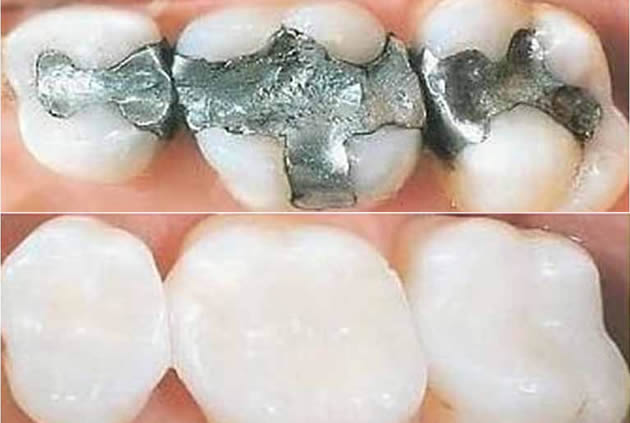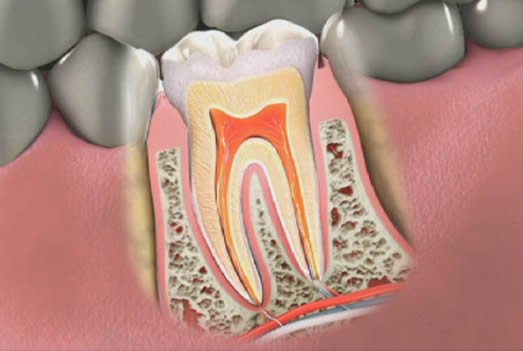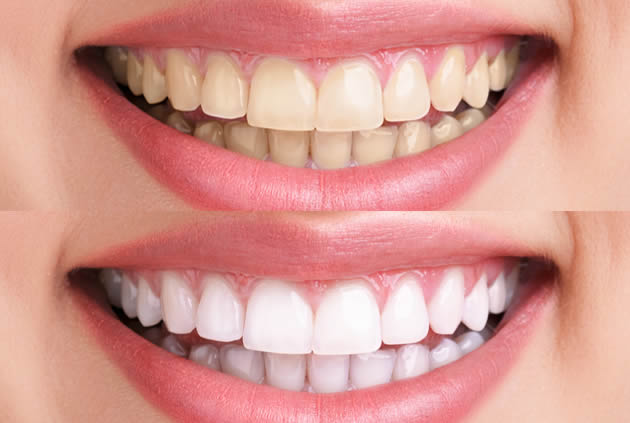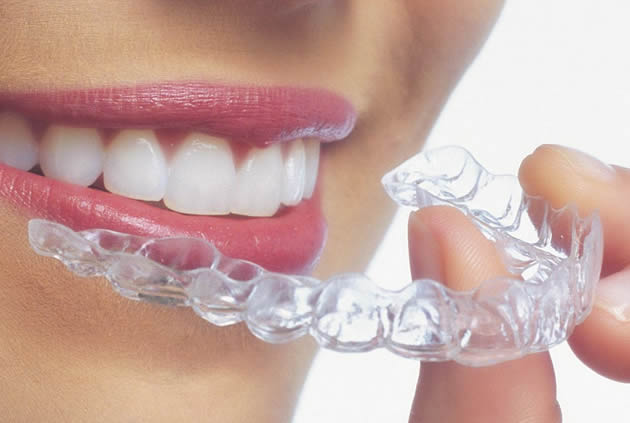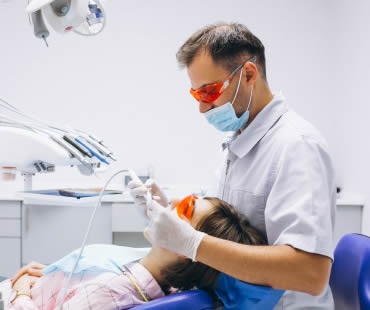
The traditional silver fillings that patients have been getting for many years have come into the spotlight in recent years. Some people wonder if these silver, or amalgam, fillings are safe because they contain small amounts of mercury.
Background
Amalgam fillings contain a mixture of half liquid mercury and half a blend of silver, copper, and tin. This material is soft and malleable, which makes it easy to be sculpted to fit well into the tooth and not affect the patient’s bite. Amalgam fillings have been used to fill cavities for over 150 years.
Risks
The concern about mercury as an ingredient in amalgam fillings is due to the health risks of toxicity or allergies associated with exposure. Significant mercury exposure can cause chronic illnesses, autoimmune disorders, birth defects, oral lesions, and mental disorders. The FDA has investigated the safety of amalgam fillings, however, and determined that the mercury levels are too low to present adverse health risks for adults or children over age six. It has also been deemed safe for nursing mothers to have amalgam fillings. Both the FDA and the American Dental Association maintain that these types of fillings are safe.
Alternatives
Patients who are uncomfortable with amalgam fillings may choose composite resin material instead. This newer type of filling is used in about 70 percent of fillings performed today, and many patients prefer the tooth-colored resin because it is less noticeable in the mouth than silver fillings. Patients who have concerns about amalgam fillings already in place may ask the dentist about switching to composite resin instead.
Take the first step towards optimal oral hygiene. Reserve your dental appointment at our Baltimore dental office now and experience personalized care.

When your tooth pulp that is located in the center of each of your teeth becomes damaged or infected, the best way to save the tooth is to have root canal therapy. This safe and effective treatment is not as painful as its reputation, and should not be avoided. Watching for signs that your tooth pulp has been compromised is an important step in saving your tooth, so that treatment may be performed before your condition becomes too advanced.
There are not always signs associated with a tooth that requires root canal therapy. Sometimes only examination, X-rays, and other tests will reveal problems. This is one reason regular dental visits are important. In other cases, symptoms are present to indicate pulp damage. Some typical signs include:
- Pain that is often related to inflamed tooth pulp, which can be caused by deep decay, chipped or cracked teeth, repeated dental procedures, faulty crowns, infection, tooth grinding, or periodontitis. Inflammation increases pressure inside the pulp cavity and triggers the tooth’s nerves. The pain may be in the tooth itself, or it can be referred to other areas in your mouth. Pain when eating or sensitivity to hot or cold is also common.
- Gum swelling near the damaged tooth
- Facial swelling
- Tooth loosening
- Pus around the damaged tooth
- Tooth discoloration, which usually occurs over a longer period of time. Discoloration can take weeks, months, or years to appear. This is another reason for regular dental checkups.
If you experience any of the symptoms above, or if your dentist identifies problems upon examination, it’s time to consider root canal therapy. Saving your natural tooth is almost always better than having to replace a lost tooth. Root canal therapy can help you keep your smile intact, as well as its function. Your natural sensations of a real tooth remain, as well as normal biting abilities. Don’t shy away from treatment; take care of tooth pulp problems when they arise.
Do you live in Baltimore or the surrounding area? Our team is ready to help you achieve your smile goals. Schedule your appointment today.

Modern lifestyles can be extremely stressful as many people have to deal with deadlines, demands and other frustrations that make up daily life. This can be an issue if you’re constantly under stress as it may affect your health. There are numerous health conditions that can be affected by high stress levels, and one of these is teeth grinding.
What Is Teeth Grinding?
Teeth grinding, or bruxism, is a condition that causes you to clench and grind your teeth together. It normally occurs during sleep so you may not even realize you have bruxism. This condition is likely to be identified by your family dentist in Baltimore due to teeth becoming worn down and chipped, or quite often a sleeping partner will complain about the grinding noise during the night.
What Does Stress Have To Do with Bruxism?
Teeth grinding has been linked to high levels of stress and anxiety. It’s been shown that people under stress are more likely to grind their teeth, particularly if they don’t have any coping mechanisms.
How Could Teeth Grinding Affect Me?
Teeth grinding can have more of an effect than you might imagine. It can cause teeth to become cracked, sensitive or even loose. Excessive grinding can damage the gums and bone surrounding your teeth, or may cause a painful disorder called TMD. This affects the jaw joints or temporomandibular joints, and can cause headaches, earache and facial pain.
How is Bruxism Treated?
Your dentist in Baltimore is likely to recommend a custom-made night guard which is worn while sleeping to protect your teeth and jaws from any further damage. It works through preventing your teeth from coming into contact. Additionally, you may be prescribed a muscle relaxant to help prevent clenching. It can be helpful to reduce stress levels through various measures which can include exercise, yoga, meditation or stress counseling.
Take the first step towards optimal oral hygiene. Reserve your dental appointment at our Baltimore dental office now and experience personalized care.

Modern dentistry allows people to keep their teeth healthy and strong. In fact, dentistry has evolved from folk practices to a medical discipline that follows scientific findings. Some common misconceptions still exist, including:
Myth: If I can’t see a problem with my teeth, they are fine, so I don’t need to visit the dentist.
Truth: Regular checkups are important even if you can’t see anything wrong. Sometimes, problems like decay and gum disease don’t present any signs until the condition progresses. Visiting the dentist for a routine exam twice a year allows the doctor to more effectively monitor your oral health.
Myth: Toothbrushes with hard bristles do a better job cleaning teeth.
Truth: Actually, most dentists recommend soft-bristled brushes because the hard bristles can remove tooth enamel, which makes your teeth more sensitive to hot and cold.
Myth: Root canal procedures cause pain.
Truth: When a tooth is severely damaged by trauma or deep decay, the soft nerve center called the pulp dies and pressure builds inside the tooth. Any discomfort you feel comes from the inflammation and infection. Most people actually feel better after a root canal, a procedure where the doctor removes the damaged tissue and seals the tooth to prevent further problems.
Myth: Teeth whitening will harm my teeth.
Truth: Both in-office and take-home teeth whitening options have evolved over the years. With a dentist’s supervision, you can safely and effectively brighten your smile.
Myth: Chewing sugar-free gum means I don’t have to brush my teeth.
Truth: Although sugar-free gum after meals may freshen breath and reduce plaque build up, you can’t use it as a substitute for brushing twice a day. Only regular brushing and flossing can get rid of the plaque already on teeth and remove food particles from between teeth.
Schedule a dental cleaning appointment today at our Baltimore dentists office.

For years, we have heard that sugar is bad for our teeth. As research has grown, scientists now understand which kinds of sugars hurt your teeth and which foods help keep your mouth healthy. A balanced diet can help keep your smile looking and feeling great.
Certain foods produce changes in your mouth that can increase the risk of tooth decay. For instance, bacteria in the mouth transform sugar and starches into bacteria that attack the teeth and weaken the enamel. As well, foods like candy, cakes, pastries, and dried fruits can stick to teeth and create a haven for bacteria.
Making healthy choices can help promote a healthy mouth. Cheeses, protein, meats, nuts, and milk can protect tooth enamel by contributing calcium and phosphorus, which will remineralize teeth. Crunchy fruits and vegetables like apples and carrots are also good choices because they contain lots of water, which encourages saliva production.
When choosing a beverage, water, milk, and teeth are the best options for your oral health. Try to cut back on soft drinks and other beverages that contain sugar. Products that contain sugar substitutes like Equal or Splenda aren’t digested the same way as true sugar so they don’t cause over production of bacteria. In fact, chewing sugar free gum can actually improve saliva production and help protect your teeth.
Children and teens should work especially hard to eat a balanced diet. Poor eating habits can not only but their teeth at risk, but it can create other problems at well. A good diet influences brain development, learning capabilities, and normal growth patterns.
Schedule a dental cleaning appointment today at our Baltimore dentists office.

Why Snacking Right Matters for Your Teeth
Oral health is essential not just for maintaining a beautiful smile but also for overall health. Diet plays a significant role in promoting healthy teeth and gums.
From the time we are children, we are taught about brushing and flossing our teeth to keep them healthy. While these habits help keep our teeth clean and free from food debris, the food we eat has a much bigger impact on our oral health than we realize.
The Role of Diet in Promoting Healthy Teeth and Gums
What you eat affects more than just your waistline; it can have a significant impact on the health of your teeth and gums. A balanced diet that includes nutrients such as calcium, vitamin D, phosphorus, and fluoride helps build strong teeth that resist decay.
Foods that are high in sugar or acidic content can erode tooth enamel over time if consumed frequently. Acidic foods gradually break down tooth enamel leading to cavities or sensitivity issues.
Good oral hygiene practices combined with healthy eating habits are necessary for maintaining optimal oral health throughout life. In the next section, we will discuss snacks to avoid when it comes to maintaining good oral health.
Snacks to Avoid
While snacking provides a quick and easy way to satisfy hunger pangs, not all snacks are created equal. Some snacks can harm your teeth by promoting the growth of harmful bacteria or eroding tooth enamel. Here are some types of snacks you should avoid:
Sugary and Acidic Snacks That Can Erode Tooth Enamel
Sugary and acidic foods and drinks can cause significant damage to your teeth over time if consumed in excess. When you eat sugary foods, the bacteria in your mouth convert the sugar into acid, which erodes the hard outer layer of your tooth enamel. Acidic foods also contribute to enamel erosion by softening the protective layer that covers your teeth.
To minimize damage from sugary and acidic snacks, it’s best to consume them in moderation or avoid them altogether. Common examples of sugary and acidic snacks include candy, soda, sports drinks, fruit juice, pickles, tomatoes, citrus fruits such as oranges and lemons.
Sticky Snacks That Can Get Stuck In Between Teeth
Another type of snack that can be harmful to your teeth is sticky food. Sticky food has a tendency to cling onto tooth surfaces for extended periods, promoting bacterial growth that causes decay over time.
Candy bars with caramel or nougat centers are common culprits for getting stuck between teeth. Similarly dried fruits like raisins can get stuck between teeth making it challenging for saliva to wash away food particles from these areas creating a breeding ground for bacteria.
To minimize harm from sticky snacks try opting for crunchy alternatives like apples or carrots instead of candies or dried fruits. Avoiding these types of snack will go a long way toward maintaining healthy oral hygiene as well as reducing the risk of cavities and tooth decay.
Great snacks for your teeth
A healthy diet plays a significant role in maintaining good oral health. Choosing the right snacks not only helps to keep your body healthy, but also promotes healthy teeth and gums. Here are some great snack options that can improve your oral health.
Crunchy fruits and vegetables
Crunchy fruits and vegetables such as apples, carrots, celery, and cucumbers are great choices for snacking. These foods are high in fiber which helps to scrub away plaque from teeth while stimulating saliva production. Saliva neutralizes harmful acids produced by bacteria in the mouth that can cause tooth decay.
Apples are particularly beneficial because they contain malic acid which aids in cleaning teeth and removing surface stains. Carrots have abrasive qualities that help to remove plaque from teeth while celery is rich in vitamins A and C that promote gum health.
Dairy products
Dairy products like cheese, yogurt, and milk are known to be rich sources of calcium which is essential for building strong bones including teeth. They also contain casein which helps to prevent tooth decay by neutralizing acid produced by oral bacteria.
Cheese is especially beneficial since it contains phosphate which helps to balance the pH level of the mouth preventing dental erosion. Yogurt contains probiotics which fight against bad bacteria that can cause gum disease.
Nuts and seeds
Nuts such as almonds, cashews, and seeds like sunflower or pumpkin seeds provide an excellent source of protein with low sugar content making them ideal for snacking. They also contain essential minerals like phosphorus, magnesium that help strengthen tooth enamel. Almonds have abrasive texture that provides a scrubbing action on teeth surfaces removing plaque buildup while cashews stimulate saliva production aiding in washing away food particles trapped between teeth surfaces.
Sugar-free gum
Sugar-free chewing gum has been shown to help prevent tooth decay by increasing saliva flow which neutralizes acid in the mouth and washes away food particles that can contribute to plaque buildup. Look for gum with xylitol, a natural sweetener that has been proven to have positive oral health benefits. Chewing sugar-free gum after meals also helps to freshen breath, making it a great option if you don’t have immediate access to a toothbrush.
Incorporating these healthy snacks into your diet not only promotes better oral health but also provides many other benefits for your overall well-being. Remember, choosing whole foods over processed snacks is always the best choice for maintaining optimal health.
Tips for Snacking Smartly
Snacking is an essential part of our daily routine, but it can have a detrimental effect on our teeth if we don’t choose the right snacks. Here are some tips to help you make smart snacking choices that promote good oral health.
Limit Snacking Frequency to Reduce Exposure to Acids and Sugars
Frequent snacking throughout the day exposes your teeth to acids and sugars, which can lead to tooth decay and other oral health problems. Instead of snacking all day long, try limiting your snacking frequency and opt for healthier snacks like fruits, vegetables, or nuts.
Rinse Mouth with Water After Snacking if Brushing Is Not Possible
If brushing is not possible after you snack, rinsing your mouth with water can help wash away food particles and neutralize any acid produced by bacteria in your mouth. This helps reduce the risk of tooth decay and gum disease.
Choose Whole Foods Over Processed Snacks
Processed snacks often contain high amounts of sugar and unhealthy fats that can harm your teeth and overall health. Instead of reaching for packaged snacks, choose whole foods like fresh fruits and vegetables or low-fat dairy products like cheese or yogurt. These types of foods are low in sugar, rich in nutrients like calcium that promote healthy teeth and gums.
By following these simple tips for smart snacking choices, you can maintain good oral health while still enjoying delicious snacks throughout the day. Remember always to consult a dentist if you have any oral concerns or questions about dietary habits that may affect your dental hygiene regimen.
Choosing healthy snacks for healthier teeth
Choosing healthy snacks is essential for maintaining excellent oral health. Snacks high in sugar, acid, and stickiness promote tooth decay and gum disease. On the other hand, snacks rich in fiber, calcium, protein, and water content strengthen the tooth enamel and promote saliva production.
Limiting snacking frequency
It’s essential to limit snacking frequency to reduce exposure to acids and sugars that cause dental problems. Frequent snacking creates an acid attack on the teeth by reducing saliva production. The less time it takes between meals and snacks increases the likelihood of developing cavities.
Rinsing mouth with water after snacking
When brushing your teeth is not possible after a snack or meal, rinsing your mouth with water can help remove food particles from the mouth. This action also helps neutralize acidic content in the mouth before brushing later.
Choosing whole foods over processed snacks
Choosing whole foods over processed snacks is beneficial for good oral health. Processed foods contain high levels of sugar which can be harmful to your dental hygiene in many ways.
A diet that includes healthy snack options like fruits, nuts, vegetables as well as dairy products such as cheese and yogurt will provide you with all the necessary nutrients required for good oral health. Practicing proper oral hygiene measures like brushing twice daily with fluoride toothpaste along with a balanced diet can help keep your teeth strong and healthy.
Ready to transform your smile? Schedule your appointment today at our Baltimore dental office.












